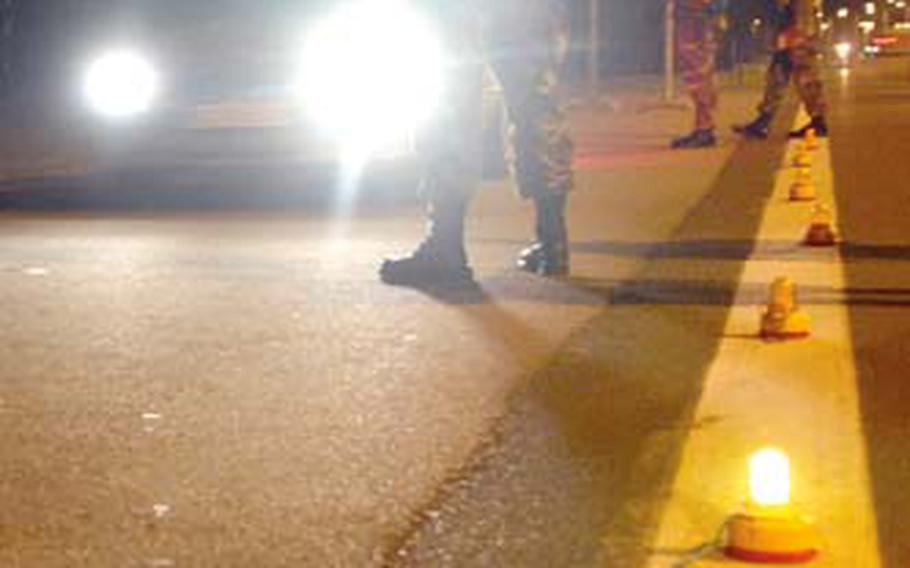
Werner Pfirrmann, a German police officer from the 435th Security Forces Squadron, stops a vehicle at a DUI checkpoint just outside Ramstein Air Base’s west gate in August 2007. The military is stepping up patrols, sobriety checkpoints and working with local police this holiday season to try to cut down on drunken driving. (Ben Bloker)
The military in Europe is using unannounced sobriety checkpoints, stepped-up patrols, local law enforcement and public awareness campaigns to put the brakes on drinking and driving this holiday season.
The efforts to reduce drinking and driving in the Kaiserslautern Military Community got started with a public awareness campaign in October about its dangers and consequences. They continued the first week of November with sobriety checkpoints at Ramstein Air Base and Vogelweh, said Air Force Capt. Justin Secrest, operations officer for the 569th U.S. Forces Police Squadron.
He said November and December historically have higher rates of driving under the influence and driving while intoxicated arrests.
An average of 13.6 DUI or DWI arrests are made each November and each December in the KMC, but last year those numbers climbed to 24 in November and 20 in December, Secrest said. This year, after that public awareness campaign spread the word over the radio and in local military papers that the military would get tough, the November arrest numbers dropped to 16.
Secrest said he believes the decline is proof that the checkpoints — in which Military Police or Air Force Security Forces officers use flashlights that can detect alcohol — are working.
Although readings from those flashlights may not be admissible in court, they could give an MP or Security Forces officer probable cause to conduct a sobriety or Breathalyzer test, Secrest added.
"The first round [of doing the checkpoints] we focused on the entrances to the bases. Since then we have kind of broadened our spectrum," Secrest said. Off-base checkpoints and patrols are being done in conjunction with the German police.
The Army is tackling drunken driving by having commanding officers get more involved with the issue.
The commanders are more likely to know where soldiers are going to party this holiday season and they are spreading the message about the dangers of drinking and driving, said Lt. Col. Carol McKinney, U.S. Army Europe’s deputy provost marshal.
Army units have designated soldiers whose job it is to stay off the sauce and use government vehicles or their own vehicles and pick up soldiers who had too much, McKinney said. The Army also has "Courtesy Patrols" that help soldiers get home.
Noncommissioned officers also participate in walking patrols and visit bars and other places where soldiers drink to keep tabs on them, McKinney said.
The Army is boosting military police patrols as well, McKinney said.
"We can surge patrols on certain nights. There will be probably additional patrols on Christmas Eve and New Year’s Eve," McKinney said. "
Army figures show that the number of DUI incidents during the holidays in Europe has not changed much in the past few years.
In the fourth quarter of the 2006 calendar year there were 162 DUI incidents involving soldiers, their dependents and civilian Army employees. That number rose slightly to 165 in 2007. And in a one-month span from Oct. 1 to Nov. 2 this year, there were 78 incidents.
The Navy also is addressing drunken driving by offering free lifts to servicemembers who are too intoxicated to drive. In Naples, Italy, the program is called Tipsy Taxi and it allows sailors to call a number to arrange for a free taxi ride home.
Navy officials are also spreading the word about the dangers of driving under the influence with safety stand-down events in which topics such as drunken driving are discussed, Navy Lt. Cmdr. Wendy Snyder said via e-mail.
Navy officials could not provide drunken driving arrest statistics as of deadline.